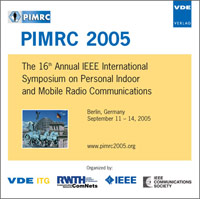Distributed Intercellular Interference Management in 4th Generation TDMA TDD Cellular Mobile Wireless Communications
Konferenz: PIMRC 2005 - 16th Annual IEEE International Symposium on Personal Indoor and Mobile Radio Communications
11.09.2005 - 14.09.2005 in Berlin, Germany
Tagungsband: PIMRC 2005
Seiten: 5Sprache: EnglischTyp: PDF
Persönliche VDE-Mitglieder erhalten auf diesen Artikel 10% Rabatt
Autoren:
Omiyi, P. E.; Haas, H. (School of Engineering and Science, International University Bremen (IUB), Germany)
Inhalt:
In this paper, a novel approach to minimising intercellular interference and maximising spectral-efficiency in a TDMA (time division multiple access) TDD (time division duplexing) cellular network with 100% frequency re-use and unequal traffic load asymmetry in different cells is presented. A new distributed medium access control (MAC) protocol called CSTDMA (carrier sensing time division multiple access) and a modified PRMA (packet reservation multiple access) protocol are applied and their performance is compared against state-of-the-art MAC protocols. CSTDMA TDD employs a modified busy-tone broadcast/channel-sensing mechanism, while PRMA (packet reservation multiple access) employs a handshaking procedure. Results show significant improvements in system capacity and spectral-efficiency from the application of this novel approach compared to the state-of-the-art, especially with the CSTDMA TDD approach, which overall achieves the best performance, offering more than 3 to 4 times the capacity and system spectral-efficiency of the traditional methods.


